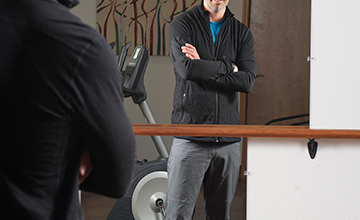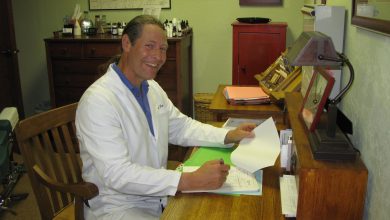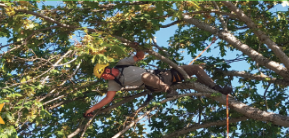Jeffery Judkins, DVM AnimalKind Holistic Veterinary Clinic
 Dr Jeffrey Judkins recently relocated to the Rogue Valley from Portland, Oregon in search of sun, a slower pace, and an acre of land for his dogs to run on. “Dr J” got his veterinary degree from Louisiana State University in 1984, and has practiced in Austin, Texas and Fairbanks, Alaska, before establishing Hawthorne Veterinary Clinic, the first holistic veterinary hospital in Portland, Oregon, in 1995. Now he brings his unique style of holistic, complementary veterinary medicine to Southern Oregon.
Dr Jeffrey Judkins recently relocated to the Rogue Valley from Portland, Oregon in search of sun, a slower pace, and an acre of land for his dogs to run on. “Dr J” got his veterinary degree from Louisiana State University in 1984, and has practiced in Austin, Texas and Fairbanks, Alaska, before establishing Hawthorne Veterinary Clinic, the first holistic veterinary hospital in Portland, Oregon, in 1995. Now he brings his unique style of holistic, complementary veterinary medicine to Southern Oregon.
Dr. Judkin’s holistic commitment to the care of animals is second to none and approaches a level of holistic care that many people have for their own family members. He is skilled in acupuncture, herbs, homeopathy, and nutrition. Clients have been known to drive many hours to have their animals treated by Dr. Judkins complimentary therapies.
Dr. J thanks for doing an interview this month. Can you start by giving us a quick overview or your clinic and how the services you provide are different than that of a traditional veterinary office?
The first thing you notice when you come to Animalkind Clinic is there are no barking dogs, no cages, no smell of disinfectants. Instead of a trip to a stainless steel exam table and an unwelcome thermometer, the client’s pet is allowed to walk around and relax while we sit down and talk at length about the animal and his/her health issues. During the exam, I’ll look at the animal’s tongue and feel his/her pulse — important information for me, but nothing you’d ever see a conventional veterinarian do.
The approach I use at Animalkind is comparable to the experience a human patient would have at a naturopathic or acupuncture clinic. A pet patient has symptoms that need to be addressed, but instead of using medicines and treatments that simply suppress or alter the symptoms, I look at the animal’s constitution, environment, diet, and emotional state to understand and address the underlying cause of the disease. Basically I see symptoms as the body’s expression of an underlying imbalance, not the disease itself.
I use acupuncture, nutritional support, herbs and homeopathy to stimulate a healing response in the patient in a way that drugs and surgery cannot do. This doesn’t mean that these conventional treatments aren’t useful in certain situations — they can undoubtedly be lifesaving at times. They are, however, limited by their very nature to address long-standing or recurring health issues, and they often have potentially serious side effects. And their use, in general, does not lead to improved overall health and vitality the way that holistic healing modalities can.
You’ve spent the last 27 years in veterinary medicine. As your own experiences and understanding of holistic medicine has grown how has this changed the way you work with animals?
I remember the case of a cat from years ago when I was working in a conventional veterinary practice. He had a severe skin allergic condition that would resolve for a few weeks after a cortisone shot. As time went on, the injection had to be given more frequently and at progressively higher doses to be effective. I recall we didn’t see the cat for some time, but when the client brought him back in months later, it was for a completely different reason. His skin was perfect, but he was emaciated and coughing.
It turned out he had advanced lung cancer. I remember having a flash of insight into what had happened with this poor fellow. The skin symptoms were a manifestation of an underlying imbalance that was suppressed by the cortisone, in effect driving it deeper into the body and eventually resulting in a much more serious condition: cancer. But his skin condition was cured!
I started noticing similar patterns in other cases — recurring ear and urinary tract infections, chronic digestive problems, behavioral problems…. I realized the more successful I was at treating the patient’s symptoms, the less healthy the animal became over time. I started looking into alternative medicine as a way to understand, and hopefully use to treat these frustrating cases. I found that holistic medical modalities did indeed provide the insight into health and disease and treatment approaches that have enabled me to treat many patients much more effectively that I ever could with my conventional medical training.
In collecting and building your body of knowledge you have had the opportunity to travel all around the world. Will you tell us about some of the interesting experiences you have had?
Helping Cuban veterinarians study for their acupuncture examinations was a great experience. I had to learn all the acupuncture channels and points in Spanish. They laughed at my pronunciations! Studying with a Mayan healer in Belize gave me insight into an indigenous medical tradition that had many similarities to the traditional Chinese medicine I had learned. Who knew the Mayan medicine men used acupuncture and tongue diagnosis? Traveling in Nepal last year, it was wonderful to view plants growing there that I’d been using in my practice of Chinese herbology for years, but had never actually seen before.
You mentioned having a colleague in Alberta, Canada who is both a Veterinarian and Naturopathic Doctor, and that he uses the same herbs and nutritional supplements for humans and animals alike. Can you talk about this in relationship to your own practice.
I have come to the realization over the years that we have more similarities to our animal friends than it appears. The herbs and homeopathic remedies I use will work just as well in a golden retriever as they will in a human — if you can identify the disease pattern correctly. If one knows comparative anatomy, human acupuncture points are easily transposed to any other animal (with legs at least!). It’s amazing to think that a three-inch-long salamander has all the same bones, muscles and nerves in his arm that a Quarter Horse has — just in different shapes and sizes.
A common misconception that we might currently hold as a society is that even though we are both mammals for some reason or another complementary / alternative medicine should not be as readily applied to animals at it is to humans. Can you comment on this.
Actually, animals seem to respond better to many alternative medicine modalities that humans do. So many human diseases are rooted in lifestyle choices and emotional states. It’s much easier to switch a diabetic cat to a low carb diet that it is to tell a diabetic person to stop eating pasta and drinking beer. Also, people drive themselves into sickness with the stress and worry inherent with modern life. Animals have fear, anxiety and stress too, but these states are much less complicated that humans tend to be, and thus simpler to treat.
Can you talk about the effectiveness have you seen demonstrated through the application of complementary medicine?
One case several years ago impressed me with the power of homeopathy. A cat was brought into my Portland clinic while I was in the middle of a surgery. He unfortunately had gotten stuck in the garage door as it was opening and ended up hanging by his foot from the ceiling for a couple of minutes. The poor kitty was yowling in pain and distress with a dramatically swollen front paw. I told my vet tech to give him a high potency of aconite, a homeopathic remedy for shock and pain, and put him in a kennel. When I finished surgery a few minutes later I went to his kennel and found him stretched out, relaxed and lying on his bank, holding up his injured paw… purring!! There’s no narcotic in the world that will do that.
Many people claim that homeopathics and herbal remedies are simply placebos. I can recount hundreds of cases that I’ve treated that would suggest otherwise. When a client sees their pet respond dramatically to an acupuncture treatment, they know it’s not a placebo.
In general, the complementary treatment modalities I use aim to promote an overall increase in the health and well-being of a patient — not just treat the symptoms of a particular disorder. By taking into consideration the animals diet, environment and emotional state, it is possible to find treatment plans that do just that.
Having recently relocated to the Rouge Valley what are you excited about being able to offer to the community?
First of all, I am thrilled to be here. People I’ve met here have been extremely friendly and supportive. There is an obvious community feel to the area that I resonate with. To have clients tell me how much they appreciate the naturopathic approach that I offer –.something they have not been able to find anywhere else — that makes me feel great and very welcome.
Do you have a success story that just kinda blows your mind?
I recently saw a cat that was diagnosed with an inoperable tumor near his heart and was given by his veterinarian three weeks (at best) to live. Six months later, with herbal and nutritional treatments, the cat is doing great… gaining weight and catching mice. A pretty impressive response that no one, including me, would have expected.
What are the top ten conditions you treat for dogs and cats?
I tend to see a lot of cases where conventional medicine has failed to resolve the condition, or has limited or unappealing treatment options. Chronic allergic skin conditions fall into this category, but also cancer cases, immune-mediated diseases, recurrent urinary tract infections, incontinence, chronic arthritis, behavioral issues and senility, disc disease and paralysis, kidney and heart failure are also common conditions. Is that 10?
Then you also offer services for farm animals as well?
I have been out on a few farm calls since I have been here. I enjoy getting out of the office and using the holistic medical principles I have learned to treat any kind of animal that people might have.
What is your approach to working with dogs with behavioral problems. Should these animals be put on medications, it seems kinda odd to put a dog on prosaic?
There are some behavioral cases where psychoactive drugs such as prozac or valium can be lifesaving from some pets. Behavioral problems are one of the most common reasons that dogs and cats are euthanized, and drugs like this can make some severe behavioral problem manageable. Having said that, my approach is to determine the underlying energetic pattern that can give rise to anxiety, fear and aggression — and then try to address it through the use of herbs, homeopathics and behavioral modification. For example, I had a case of severe separation anxiety in a Great Dane resolve completely after six weeks on a Chinese herbal formula. The client was extremely grateful — his newly adopted rescue dog had been ripping his house to shreds!
Dr. J, can you talk about your human clients. Other than having an appreciation for holistic medicine what are some other common values you share?
My clientele is quite diverse, but my clients tend to be very responsible, caring guardians, and share a commitment to animal welfare, in general. Most care about the use of pesticides and other toxic chemicals in our environment, and about overuse of drugs such as antibiotics and cortisone for themselves and their pets. I’d also say that while some may be a bit skeptical, most of my clients are open-minded and eager to learn new concepts.
You also work with herbs. What would be an example of when you might administer an herbal treatment or remedy?
I use herbs — both Chinese and Western — in almost every case I treat. Just recently, I prescribed teasel (a common weed around here) root that I harvested on Anderson Butte for a ruptured disc in a dog. I love getting to know the medicinal plants in our area and being able to use them in my practice. It’s a great way to get better connected to our incredible and diverse natural surroundings!
One word: NUTRITION
Why in the world does any cat and dog food contain corn?
This is such a huge, important topic. Nutrition is probably the most important factor in animal and human disease in our society today. Just look at the ever-increasing rates of diabetes, heart disease and cancer in people — all of which have significant nutritional causative factors. The same is true in pets. Almost every chronic disease (those that have ongoing or endlessly recurring symptoms) that I see in my practice, has an underlying nutritional factor. I’ve seen cats that have had ongoing diarrhea for years have normal stools just days after switch them to a homemade diet. Dogs have had their epileptic seizures stop after switching to diets free of grains and soy.
Since dogs and cats are carnivores, they generally benefit from lowering or reducing the amount of grains in their diets. Think about it: Would you ever see a cougar in the wild eating a rice cake or a piece of cornbread? Herbivores such as horses, goats and llamas need access to good quality grass and hay. Health problems arise when animals eat diets that are not appropriate for their species. The closer you are to recreating the ancestral diet of an animal, the healthier it will be. And in general, the less processed and fresher, the better — just as with people.
And lastly, one of the scarier issues involving the foods we, and our companion animals eat, are GMOs — foods that are genetically modified. Almost all the soy and corn grown in the US in the last 15 years has been genetically modified. There have been numerous accounts of cattle and pigs raised on GMO feeds that had severe reproductive problems and increased levels of infectious diseases — which all resolved when the farmers switched to non-GMO feeds. Recent research on test rats that were fed GMO foods showed a increased rates of cancer and infertility. Right now, the only way to be assured that your and your pet’s food does not contain GMO’s is to buy organic. There are several brands of organic pet foods available, and others such as Orijen and Acana that are produced in Canada with GMO-free ingredients. It’s also possible to make pet foods from scratch using healthy, fresh whole foods. It’s important to pay close attention to the nutritional requirements of the animal you are feeding, but it’s not as difficult as it may seem. There are many good books on the subject, such as Dr. Becker’s Real Food for Healthy Dogs and Cats, or Dr. Billinghurst’s seminal Give a Dog a Bone.
Finally, in getting introduced to the Rouge Valley, how do you hope potential clients will find out about you and your practice?
I’m planning on giving talks on holistic health care and whole foods nutrition for animals in the near future. Also, I am offering free 15 minute consultations for clients to get a chance to meet me and find out how I would approach their pet’s health care. Call the clinic for an appointment.
Learn More:
Name Animalkind Holistic Veterinary Clinic
Address 310 E california St, Jacksonville
Email drj@animalkindvet.com
Phone 541 702-2288
Website www.animalkindvet.com




